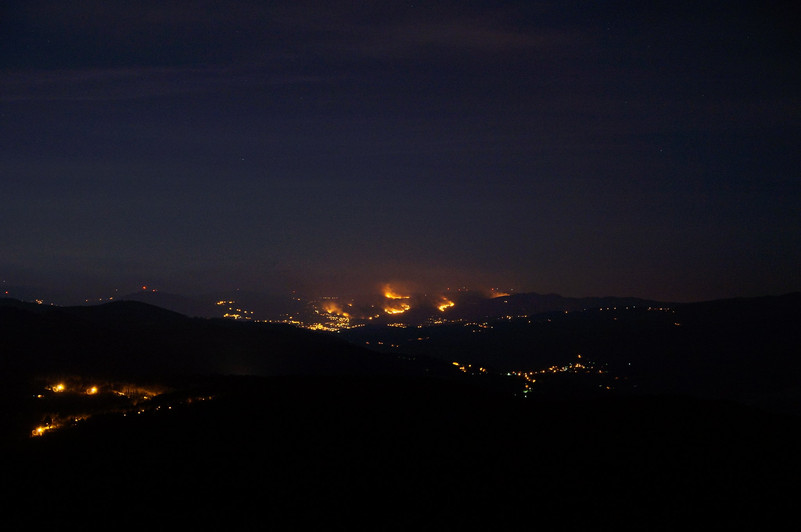
Wildfires have been raging in France, Greece, Portugal and Spain (Photo: Ricardo Faria)
Thousands of people have been evacuated from their homes in France, Portugal, Spain and Greece where firefighters have been struggling to contain fires fuelled by high temperatures.
In Spain, wildfires have destroyed more than 72,000 hectares — almost double the last decade’s average, according to prime minister Pedro Sánchez.
Portugal has seen a similar scenario, where a national-record temperature of 47 degrees Celsius was recorded last week, worsening droughts.
France’s southwestern Gironde has seen blazes devouring nearly 11,000 hectares, while forest fires have also forced the evacuation of citizens in Croatia and Turkey.
But the heatwave is now moving north.
Britain is set to reach its hottest day on record on Tuesday (19 July), as temperatures could soar to 41 Celsius degrees.
The record high temperature in the UK is 38.7 degrees Celsius, which was reached three years ago.
UK authorities have described the heatwave as a ’national emergency,’ with experts warning that such temperatures have been made far more likely by climate change.
Unprecedented temperatures of 40 degrees Celsius or more in the UK could be up to 10 times more likely in the current climate than under a “natural climate unaffected by human influence,” the World Meteorological Organization said on Monday.
London Luton Airport has seen flights halted as extreme heat melted the runway, with no let-up expected for Tuesday, while hundreds of schools and trains are being cancelled across affected areas.
Ireland recorded temperatures of 33 degrees Celsius in Dublin, its second highest temperature in history.
Belgium is also expected to hit 38 degrees Celsius, while temperatures in neighbouring the Netherlands are forecast to rise above 35 degrees Celsius.
The heatwave has also reached Germany, where temperatures are expected to peak on Tuesday and Wednesday, with some areas even reaching 40 degrees Celsius.
Meanwhile, researchers at the European Commission said nearly half (46 percent) of the EU was exposed to “warning” drought levels.
’The danger zone’
UN chief António Guterres warned on Monday that “half of humanity is in the danger zone” facing extreme weather events fuelled by climate change.
“Nations continue to play the blame game instead of taking responsibility for our collective future,” he said.
Under the 2015 Paris Agreement, world leaders committed to limiting global warming to 1.5 degrees.
But the planet has warmed by an average of more than 1 degree compared to pre-industrial times.
The United Nations Intergovernmental Panel on Climate Change (IPCC) previously said that the number of deaths and people at risks of heat stress in Europe will increase by two to threefold at three degrees compared to 1.5 degrees.
Subscribe to view notification of our daily news
RwandaPodium © All Rights Reserved. Powered by thesublime.rw